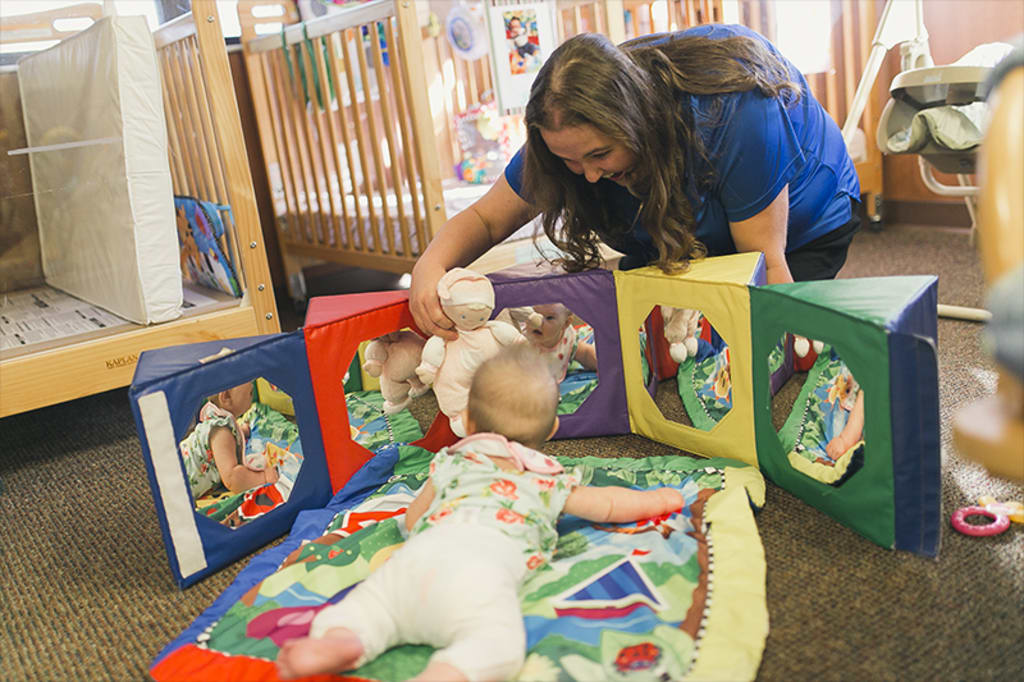Behind the Closed Door of an Infant Classroom
P.S. It is not "just babysitting."

Nine o’clock in the morning is when my day begins. What do I do? I keep babies alive, safe, and I prepare them for the future. There are the skills learned in which they will use every day. Skills such as social skills, self-help skills, and emotional regulation.
Social skills help us make friends, get the job, communicate, understand others, and complete day to day tasks such as a trip to the store. In my classroom we teach babies who are developing these social skills. We express biting/hitting hurts, helping friends is nice, and we navigate them through the complexities of how to play and be social with others.
Self-help skills are crucial to our independent and demanding society. The ability to complete task by yourself sets these children up for success. We teach them how to wash their hands, something they will do several times a day for the rest of their life. We teach them how to feed themselves and later on—into toddlerhood—how to use the bathroom without help.
Emotional regulation comes into play in developing both social skills and self-help skills but, it is an important skill for daily life as well. It is also a skill, debatably, in which many adults—including me—continue to work on. We demonstrate and encourage healthy ways to express an emotion. Ways such as using signs (sign language) or words to express a need or want.
The first three years of life are the most important. There is a huge amount of learning and development taking place. These three skills are not even the half of it. My classroom is a place in which we pay attention to the development of the children we care for and we encourage them and get excited with them. Some of the many aspects of development we observe, encourage, and guide are:
- Sense of Self
- Social Relations
- Creative Representations
- Movement
- Communication & Language
- Exploration & Early Logic
These aspects of development are outlined in further detail in one of our observation tools known as: High/Scope Child Observation Record for Infants and Toddlers.
When I get to work in the morning I am already on the move. First task, after saying good morning of course, is assisting and encouraging cleaning up the toys. Then, we help children find a sit at the table, encouraging older ones to pull out their chairs, sit down, and push in. After breakfast (in which everyone gets different food/drinks) they all get washed up, older ones clean their space by throwing their stuff away and then going to the sink as we help them wash. As they play we do diapers, bottles, naps, clean up breakfast, supervise, and get sunscreens on some or all of them for outside. Then, some or all of them go outside (depending on ratios and if anyone is sleeping). After outside play it is diapers, hand washing, and to the table for lunch. By this time, it is only noon, and much has occurred.
After lunch—which is an encouragement on using plates, utensils, and cups correctly—is nap. Nap is a mixture of rubbing backs for older kids on mats, rocking younger infants yet, and a couple of bottles. When they are all asleep we clean up lunch which is like a tornado of food everywhere, we do the day sheets as feedback for parents, and we get anyone back to sleep who wakes. The afternoon is essentially more diapers, snack, and play. Hardly do we ever get to sit down in this class with a room full of a maximum of eight infants every day.
With a brief run through of my work day and several skills and facts laid out here, I would hope no one who has read this thinks of early care as babysitting if they ever did. If you do think of it this was, I would strongly encourage you to observe a quality infant or toddler classroom at some point, maybe even volunteer for a day. You will see a lot.
The phrase, “It is just babysitting,” is hurtful and incorrect. There is a lot happening behind the closed door, a lot of great activities and a lot of development of lifelong skills. There are many caregivers—me included—who find these years of life precious and interesting. We do not “babysit.” We learn from these amazing children and they learn from us. We set these children up for success by starting them off right with love, patience, encouragement, nurture, experience, and instilling a positive outlook on life. Nine o'clock in the morning is when my day begins and, despite the stress of it, I enjoy the busy and important work I get the pleasure of partaking in every day because it is important, and I love these children.
About the Creator
Sam Cooney
Current College Student and Full Time Early Childhood Educator with an Associate Degree and years of experience with children mostly infants/toddlers.






Comments
There are no comments for this story
Be the first to respond and start the conversation.